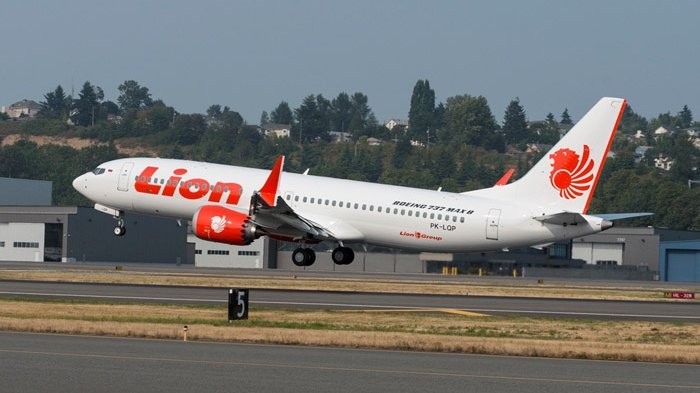KNKT confirms presence of third pilot who saved earlier Lion Air flight
The pilot is Boeing 737 MAX 8 qualified and has been interviewed by the KNKT.
Change Size
 “Regarding flight JT043 from Denpasar to Jakarta, which had problems after the replacement of an angle of attack [AOA] sensor, the KNKT confirms that another pilot was present in the cockpit of the plane,” head of the KNKT Soerjanto Tjahjono said. (Courtesy of Lion Air/-)
“Regarding flight JT043 from Denpasar to Jakarta, which had problems after the replacement of an angle of attack [AOA] sensor, the KNKT confirms that another pilot was present in the cockpit of the plane,” head of the KNKT Soerjanto Tjahjono said. (Courtesy of Lion Air/-)
T
he National Transportation Safety Committee (KNKT) has confirmed the presence of an off-duty pilot on board Lion Air flight JT043 from Denpasar to Jakarta on Oct. 29, 2018, whose actions have been cited in media reports as having saved more than 100 lives.
The flight suffered problems but landed safely in Jakarta. The next day the same aircraft, a Boeing 737 MAX 8, on flight JT610 from Jakarta to Pangkal Pinang in Bangka-Belitung Islands crashed into the Java Sea shortly after take-off with the loss of all on board.
“Regarding flight JT043 from Denpasar to Jakarta, which had problems after the replacement of an angle of attack [AOA] sensor, the KNKT confirms that another pilot was present in the cockpit of the plane,” head of the KNKT Soerjanto Tjahjono said.
The KNKT has not identified the pilot.
“The pilot is Boeing 737 MAX 8 qualified. The pilot in question has been interviewed by the KNKT,” Soerjanto went on.
However, Soerjanto declined to elaborate on the role of the off-duty pilot in saving the aircraft.
He also denied that there was any recording of flight JT043 in the cockpit voice recording (CVR) of flight JT610.
Earlier, media reports quoting sources who were close to the case said the so-called dead-head pilot on the flight from Bali to Jakarta told the crew to cut power to the automated system designed to lower the nose of the plane when it receives information from the AOA sensors that the aircraft is flying too slowly or steeply, and for them to take back manual control of the plane. According to analysts this is part of a checklist that all pilots are required to memorize.
On Mar. 10 a similar Boeing 737 MAX 8 operated by Ethiopian Airlines on flight ET302 crashed in similar circumstances to JT610. However, the KNKT has said it is too early to say whether the same problems that caused the crash of JT610 occurred on ET302.
“The KNKT will provide data [to assist the investigation into the] ET302 crash and if there are any more developments we will study and analyze them thoroughly to complete our data on the Lion Air JT610 crash,” Soerjanto said.
The KNKT also said that media reports supposedly quoting details of the conversation between the pilots recorded by the CVR of the ill-fated flight JT610 should be treated with caution. "The KNKT thinks the reports contain interpretations made by some parties rather than precise transcripts of recordings from the CVR," the committee stated at a press conference, stressing that the KNKT had not released any CVR recordings.
Other media reports, again reportedly quoting sources, have said the JT610 pilots frantically searched for a solution during the last minutes of the flight. (mai)









